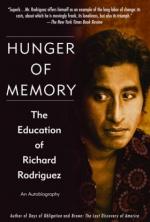
|
| Name: _________________________ | Period: ___________________ |
This test consists of 5 multiple choice questions, 5 short answer questions, and 10 short essay questions.
Multiple Choice Questions
1. When Rodriguez's mother becomes more fluent in English, she convinces her husband to buy _________. (fill in the blank)
(a) A television.
(b) A new car.
(c) A house.
(d) A telephone.
2. Rodriguez has acknowledged that his relationship with his family changed as he became more educated. What does he say about how that affected his success?
(a) He does not complain about the change because he is so glad to be well-educated.
(b) He used it to explain to people what his life was like before he was educated.
(c) He used it to motivate him to try harder.
(d) He used it as an excuse to not work very hard.
3. Where does Rodriguez believe English should be spoken?
(a) In private, with family or close friends.
(b) Everywhere.
(c) In the classroom.
(d) In public.
4. Rodriguez describes events that happened how many years ago?
(a) 20 years.
(b) 5 years.
(c) 30 years.
(d) 10 years.
5. How does Rodriguez's grandmother affect his ideas on language?
(a) Translating her stories shows him how things get lost in translation.
(b) Her stubborn refusal to speak English shows him how people cling to old ideas.
(c) She tells him Spanish is the best language.
(d) Translating her stories helps him realize that intimacy is not connected to one language.
Short Answer Questions
1. What does Rodriguez learn about sin?
2. How does Rodriguez feel when he observes the group of black teenagers on the bus?
3. In The Achievement of Desire, Prologue, Rodriguez says that now that he is successful, people always ask him a certain question. What is it?
4. What is Rodriguez's initial response to bilingual education?
5. As Rodriguez moves into college and graduate school, how does his relationship with his parents change?
Short Essay Questions
1. Rodriguez is trained in Catholic ideas and rituals at a young age. What does this do to his understanding of other religious beliefs and practices?
2. What conflicting messages does Rodriguez's father give him about getting an education?
3. Rodriguez's family continues to speak to him in Spanish. What does that suggest about what they think about the value of Spanish?
4. How does Rodriguez feel as his education comes to an end?
5. What does Rodriguez identify as the pros and cons of bilingual education?
6. How does learning to speak English change Rodriguez's mother? His father?
7. How does Rodriguez describe himself as a student?
8. How does Rodriguez feel about bilingual education?
9. What does Rodriguez discover about language and intimacy? What family member helps him to figure that out?
10. How does Rodriguez view his parents' use of English?
|
This section contains 978 words (approx. 4 pages at 300 words per page) |

|




